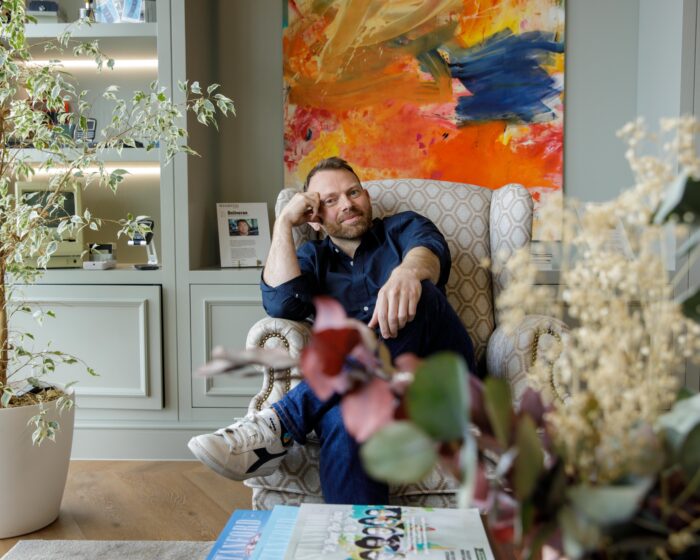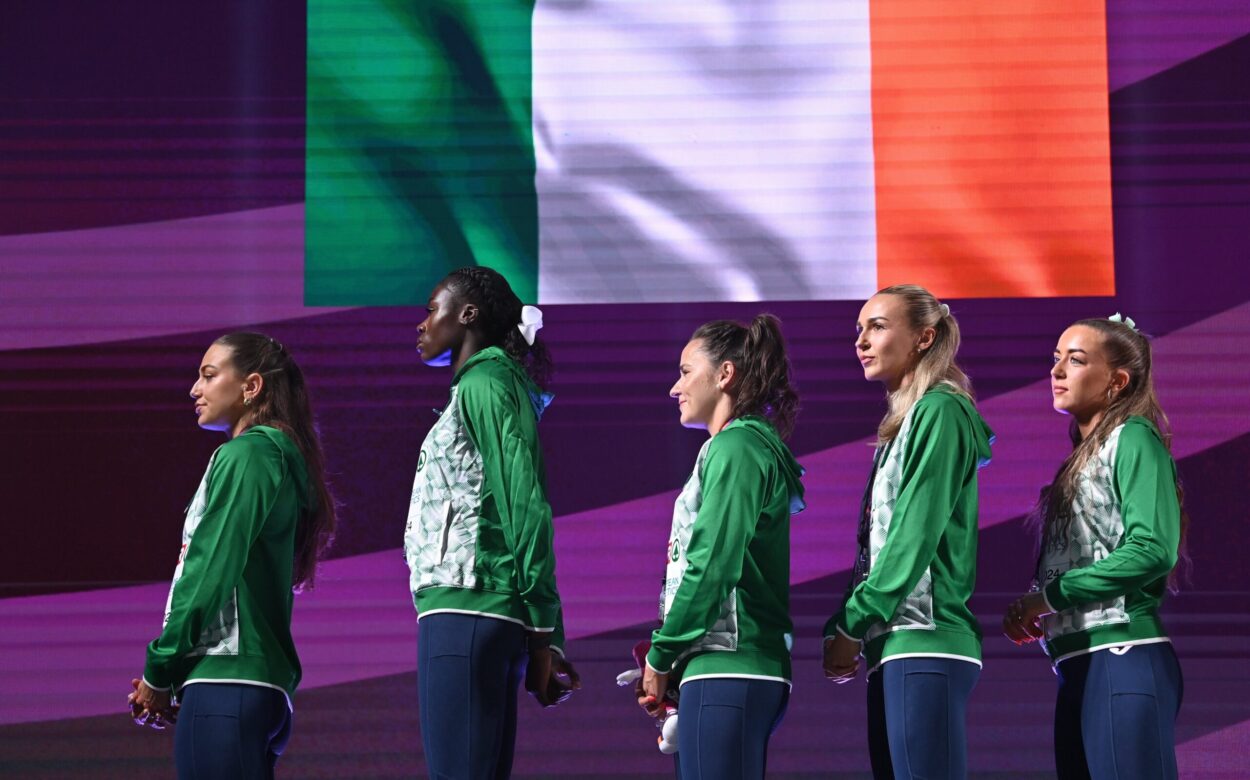Hamish Adams has taken the road less travelled.
But, as we spoke on Friday, it was obvious that the road brought him to a thoroughly happy place.
Ireland’s athletes created history in Rome last week, winning a string of medals at the European Athletics Championships. For Adams, the chief executive of Athletics Ireland, the warm glow in the aftermath of success was a welcome respite from balancing budgets, managing expectations, and increasing the profile of the sport.
Before we spoke, Adams had just left the Department of the Taoiseach, where Simon Harris had welcomed and congratulated members of the team. When the conversation ends, Adams will be on his way to another event.
“It has been hectic, but hectic in a good way,” he says.
Track medals at major events are a rarity for Ireland. Two golds and two silvers in one week was unprecedented (complimented by a host of finalists and national records).
“It has been quite the week alright,” says Adams.
Born and raised in New Zealand, Adams first came to Ireland almost a quarter of a century ago, pitching up in Cork as the head coach of Dolphin Rugby Club.
This was followed by a stint as academy manager with Munster Rugby and six years with the Irish rugby players’ association IRUPA (including a tenure as acting chief executive).
By 2013, he was chief executive of Rowing Ireland, and five years later, he took over as head of Athletics Ireland.
Adams is enjoying the success of Team Ireland but is also conscious not to let the sport get ahead of itself.
Throughout our conversation, he resists the temptation to lobby for heightened levels of government financial support, arguing that athletics in Ireland should have sustainable funding, augmented by incremental annual increases.
“That is the beauty of the model,” he says. “We have consistent funding with incremental growth.”
The way Adams sees it, sustainable and guaranteed funding is better than cyclical support based on the success or failure of athletes at major championships.
Athletics is a minority sport in Ireland (although, as I will discuss later, the number of participants is on the rise).
And, as a minority sport, it gets nowhere near the state funding levels of the larger organisations.
The most recently available accounts for Athletics Ireland date back to 2022. That year, the organisation generated total income of €7 million.
The numbers fell for the two previous years with Covid impacting its capacity to generate external sponsorship money and revenue. Revenues from the public purse during those Covid-impacted years, in fact, continued to climb, highlighting Adams’ point about the importance of resilience. This graph shows funding from Sports Ireland to Athletics Ireland.
Following this trend, Adams said the figure for this year was likely to top €5 million. Some of this was incremental, but, also, 2024 is an Olympic year and the association would likely expect some additional funds.
What Adams and his colleagues do with this money is a delicate balancing act. It is tasked with increasing participation across all levels throughout the country, but it must also develop and support high-performance athletes.
Rhasidat Adeleke is a generational athlete, blessed with so much ability that she could pick her US college of choice, chose Texas as her training base, and as soon as she left the college circuit, picked up a host of sponsorship deals with blue-chip corporates. Most athletes, however, are not Rhasidat Adeleke. And they need support from the governing body to advance.
Of the €4.2 million that came in from Sports Ireland in 2022, some €1.5 million went to high performance athletes. Of that, €842,000 is what is classified as core funding (for use by Athletics Ireland) while €469,000 went on carding payments for athletes (essentially, tiered payments to international standard athletes).
While €1.5 million comes from the state, Adams said that Athletics Ireland throws in a further €500,000 from its own funds to augment the high-performance scheme through capital projects or additional grants.
It can afford to. Even during the pandemic period, it turned modest surpluses, and, at the end of 2022, had a retained surplus on its balance sheet of €1.9 million.
Adams says it was careful with resources and had to offset how much it put towards grassroots activities versus elite athletes.
“High performance is around €2 million a year, including what we put in ourselves,” he says. “High performance is a bottomless pit. You could double it overnight and you would still be looking for more. You will always find a home for it. The key is to make it sustainable.”
The system has also benefitted from increased capital expenditure by the state over a number of decades. Bertie Ahern might not have achieved his dream of building a national stadium in Abbotstown, but he did succeed in turning it into a sporting campus with indoor arenas, high-level training facilities, and the well-regarded Sport Institute Ireland.
The track at Santry in north Dublin, home of the national championships, has been upgraded, while facilities have also been built around the country.
For Adams, it is a matter of balancing objectives with outcomes. “We have to be careful,” he says when referring to capital projects. “We need to build facilities in areas with the right population densities.
“There is no point building a track if there is no one to use it. But there are massive opportunities for working with other sports in developer multi-sports facilities.”
It has all created a better eco-system. In the four-year cycle leading up to the Rio Olympics, Ireland got 12 medals at major events (including underage). In the four years that followed, the number rose to 30, ahead of its target. For this Olympic target, the target is 30, but that could well be exceeded.
Participation numbers, meanwhile, are on the rise, with membership of Athletics Ireland increasing consistently since 2011 (Covid years excluded).
More can be done. A review by Athletics Ireland after the Toyko Olympics four years ago recommended a clearer coaching structure and model, greater athlete support outside Dublin, and enhanced transparency of athlete funding.
Meanwhile, a 2022 high-performance strategy prepared by the association set goals for the years that followed. This year’s goals include developing the “financial capacity to create a full-time Head Coach role” as well as investing a minimum of ten coaches in priority athletes.
Given the success of the past week, they might seem modest. But Adams and his association are determined to build something that can last.
“You don’t want a situation where the number goes up dramatically if you are doing well and it is cut off when things are not going as well. We want certainty. And we have that,” he says.
*****

Elsewhere last week, our London Editor Michael Cogley caught up with Dylan Collins. Nine months after leaving SuperAwesome, the kid-tech business sold in a massive deal to Epic Games, Collins reflected on the most meaningful company he's ever built and weighed up what's next.
Hometree, led by Dubliner Simon Phelan, secured a £250m asset-backed debt facility from Barclays to finance residential renewables across the UK. It is a first that others will follow. Phelan spoke to Tom about the deal - and what comes next.
In the aftermath of the local and European elections, Tommie wrote that the ballot showed that anger doesn’t cut it with enough voters. He said people want policies that offer the chance of better times. "Facing an energised Government, Sinn Féin needs to change its message," he wrote.
Stephen, meanwhile, wrote that the right’s consolidation was the story of the elections in 2024, not Sinn Féin. However, based on experience elsewhere, he said there was not enough time to create a concrete, well-organised, hard-right or populist alternative for the coming general election.
Global aircraft lessors are claiming billions in losses from aircraft detained in Russia following war sanctions. In a legal battle set to last six months, the Commercial Court got a first taste last week of why major insurers like Lloyds and AIG have declined cover. The case will run and run.
Two years ago, HR and employee engagement expert Aisling Teillard sold Our Tandem to Swiss-based beqom, moving to Switzerland in the process. She talked about the company, the sale process, and how AI will impact the future of HR.


